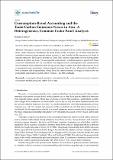Consumption-Based Accounting and the Trade-Carbon Emissions Nexus in Asia: A Heterogeneous, Common Factor Panel Analysis
Author(s)
Liddle, Brantley T.
Downloadsustainability-10-03627-v2.pdf (899.0Kb)
PUBLISHER_CC
Publisher with Creative Commons License
Creative Commons Attribution
Terms of use
Metadata
Show full item recordAbstract
This paper considers a recently developed consumption-based carbon emissions database from which emissions calculations are made based on the domestic use of fossil fuels plus the embodied emissions from imports minus exports, to test directly for the importance of trade in national emissions. The People’s Republic of China (PRC) alone is responsible for over half the global outflows of carbon via trade. The econometric estimations—which focused on a panel of 20 Asian countries—determined that: (i) trade flows were significant for consumption-based emissions but not for territory-based emissions; and (ii) exports and imports offset each other in that exports lower consumption-based emissions, whereas imports increase them. Hence, all countries should have both an interest and a responsibility to help lower the carbon intensity of energy in countries that are particularly important for global carbon transfers—the PRC and India. Keywords: consumption-based emissions; international trade; trade and environment; common
factor panel models; net global carbon flows; Asia
Date issued
2018-10Department
Massachusetts Institute of Technology. Department of Civil and Environmental EngineeringJournal
Sustainability
Publisher
Multidisciplinary Digital Publishing Institute
Citation
Liddle, Brantley. “Consumption-Based Accounting and the Trade-Carbon Emissions Nexus in Asia: A Heterogeneous, Common Factor Panel Analysis.” Sustainability, vol. 10, no. 10, Oct. 2018, p. 3627.
Version: Final published version
ISSN
2071-1050